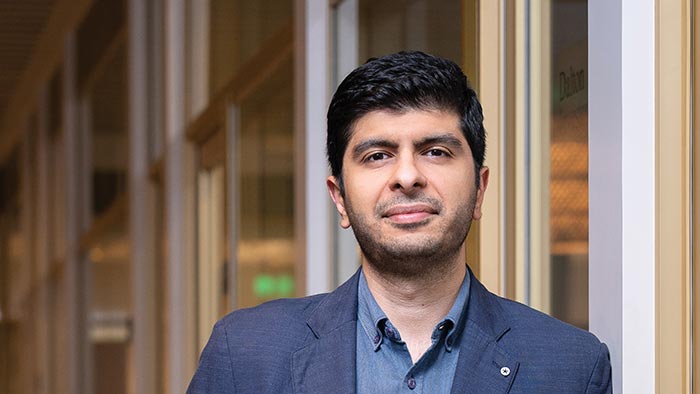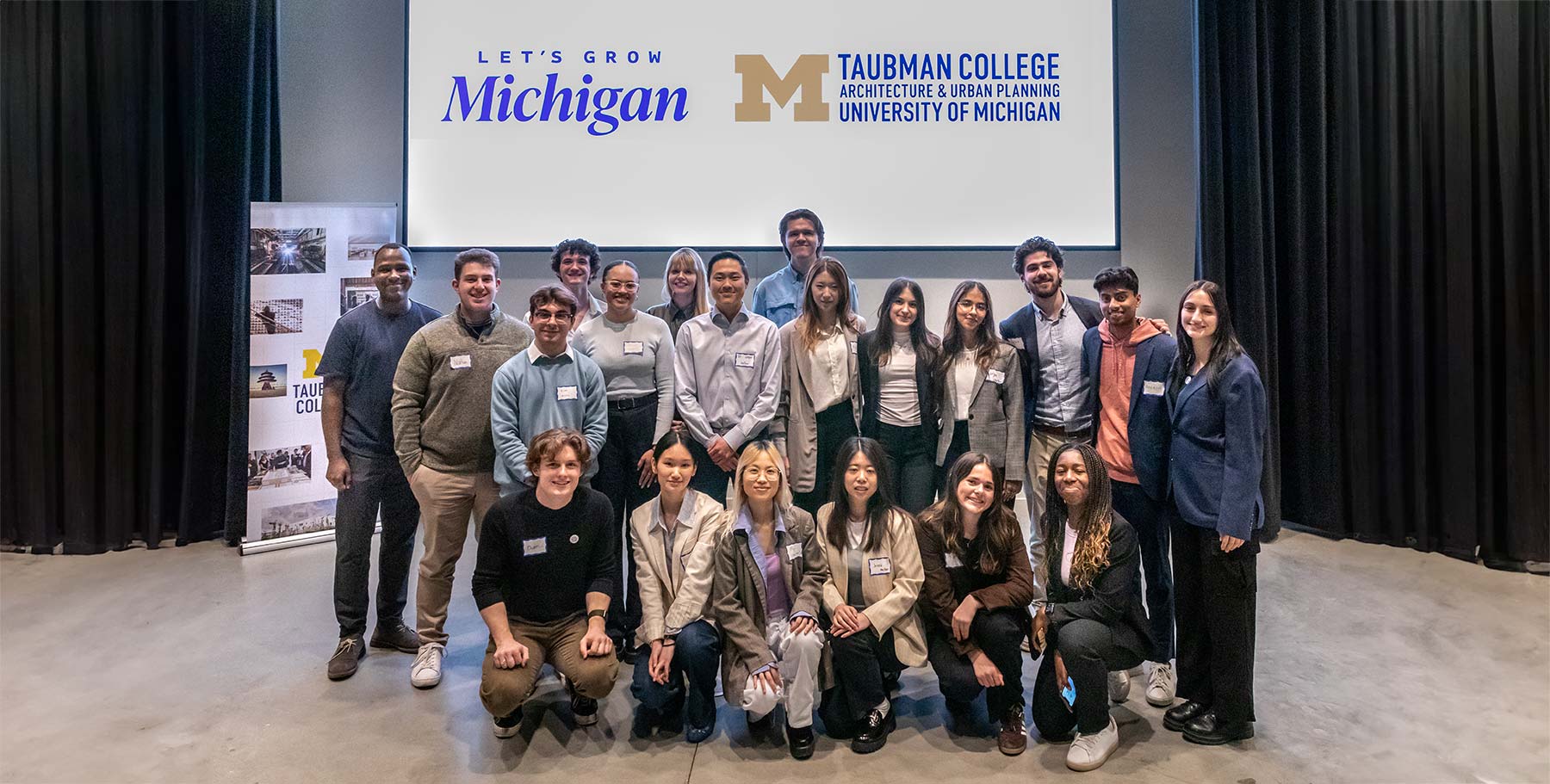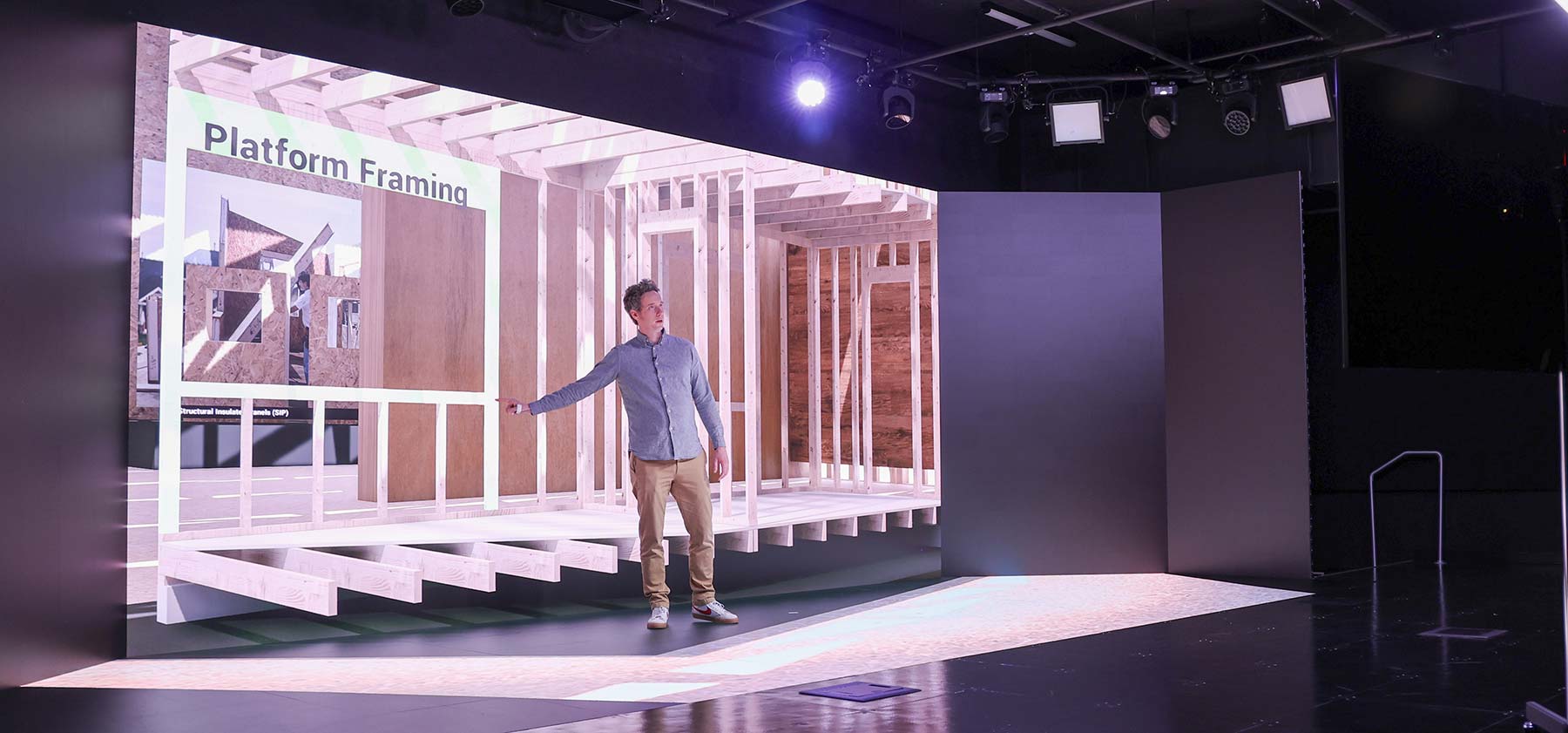When Robin Chhabra launched a business that would enable people to work in more cost-effective, flexible ways, he had no idea that just a couple of years later, the COVID-19 pandemic would upend practically everything about the global workforce. While it has been a challenging time, Chhabra, B.S. ’08, M.Arch ’13, sees opportunity.
“As society begins to reopen, people are going to want flexibility,” he says. “But at the same time, people are realizing how difficult it is to work from home.”
That’s good news for Chhabra, who is the founder of Dextrus, a Mumbai co-working enterprise that recently opened its second location in the megalopolis.
Before the pandemic, the original Dextrus location, in the heart of Mumbai’s bustling financial district, was at full capacity, with a mix of clients ranging from large banking and investment companies to small nonprofit organizations and startups.
While Dextrus does have space for individual workers to drop in — think of the pre-pandemic clusters of laptop users at your neighborhood coffee shop — its bread and butter is creating customized office spaces for longer-term use by companies with 20 or more employees onsite.
“When companies come to us, we show them a portion of our space that is just flooring and ceiling; everything in the middle, the walls, the layout, is waiting for the client,” Chhabra explains. “We provide enterprise solutions where we design, build, and operate the space along with the client who will ideally use it for several years.”
Beyond dedicated office spaces, Dextrus provides shared spaces like cafes and breakrooms for clients to comingle.
In the complex and expensive world of commercial real estate in Mumbai, long-term rental of a custom-designed space becomes more viable for many organizations: small, early-stage companies, as well as multinational corporations who need a home base in India. Dextrus’ foreign clients include a Japanese real estate company and a Korean firm that secures investments for large-scale infrastructure projects. “We are able to help clients realize savings on costs without sacrificing on their needs,” Chhabra explains.
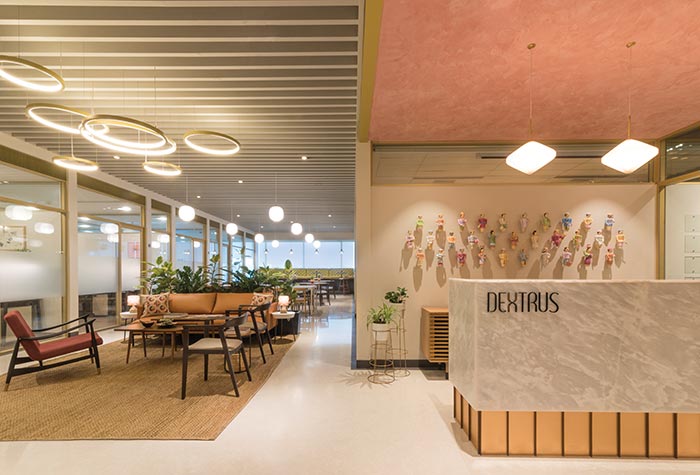
The design thinking at the core of Dextrus’ business model stems from Chhabra’s frustrations as a practicing architect earlier in his career. Between his undergraduate and graduate studies, Chhabra spent a couple of years practicing at a firm in Singapore; after his M.Arch, he spent three years as a senior architect with Serie Architects in Mumbai. At Serie, he worked on a variety of projects, including religious institutions, residential and hotel complexes, and interiors. “We jumped on projects and competitions where we’d have two weeks of working like crazy to make drawings and proposals, working very long hours and figuring it out as we went along. But it was a rich, nourishing, fulfilling experience,” he says.
Two of Chhabra’s biggest projects with Serie were unbuilt: a hotel in Goa and a residential tower in Mumbai. “I spent two years designing and redesigning it, with a lot of starts and stops,” Chhabra says of the Mumbai project, “and that happens a lot in Mumbai because of shifting legal frameworks and developers’ budgets,” he says.
An additional wrinkle with the residential project was its location on a heritage plot. The standards and framework Chhabra had to work within were challenging, reminding him of similar roadblocks with a hotel project he worked on during his time in Singapore. The recurring barriers felt like a pivotal moment, Chhabra says: “Over and over again, developers were not understanding design elements. There was always this push and pull, and by the time I was working at Serie, it was shelving projects on a regular basis.”
Developers who abruptly ran out of financing stopped returning his calls, and others loved everything about the renderings and kept saying they were on board with the plans — until one day they’d get cold feet about the cost and Chhabra would have to start over. “I wondered why we struggled so much to execute projects that we all said we believed in,” he says. “And I realized that we as architects don’t understand the business of building.”
In India, Chhabra says, that problem is especially acute: “Architects don’t really understand how to use design to enable profitability in a project, and developers don’t understand what the architects are trying to accomplish, so there’s a big disconnect from both sides.”
As a result, Chhabra, who had labored to create beautiful designs that stalled in development, felt a growing existential crisis about the practice of architecture that was born during his time in Singapore but grew during his practice in Mumbai.
“I had been immersing myself in design — learning how to design, thinking about design and how important it is — but now I wanted to also understand how my design ideas and decisions materialize into costs and perhaps future problems. I wanted to rethink how architectural practices can evolve beyond just design studios.”
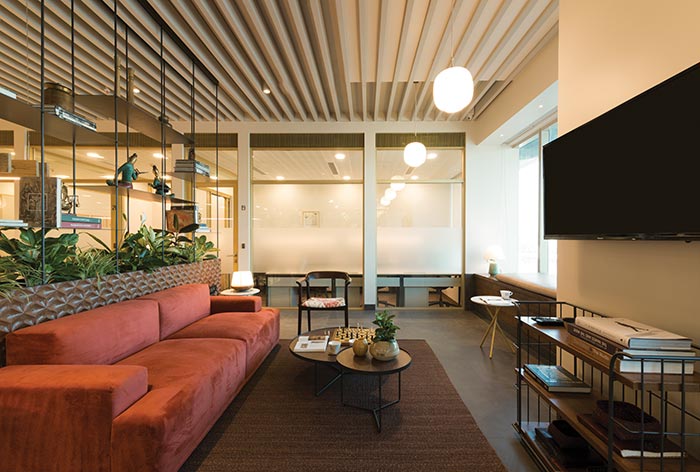
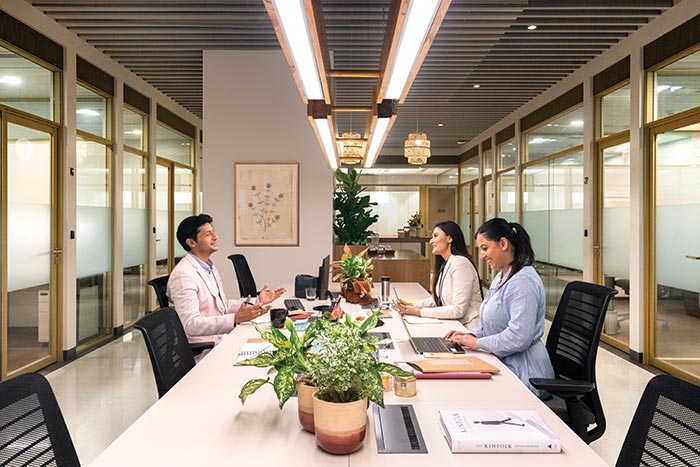
While Dextrus has space for individual workers to drop in, its bread and butter is creating customized office spaces for longer-term use.
A friend told Chhabra about a new American company called WeWork, and as Chhabra learned more, he realized that creating a co-working space in Mumbai would give him the opportunity to explore his desire to merge design thinking and business thinking. The business thinking would provide a decision-making framework to enable Dextrus to survive and flourish over multiple decades. The design thinking would enable Dextrus to create a space that would be attractive to clients.
“People spend a lot of time working, so it’s got to feel like something that they love going to every day,” Chhabra notes. “Design answers that problem, not business. But at the same time, since we are the ones designing, building, and operating, we’re constantly asking, ‘is this worth it? Can we value engineer this? Are there better ways?’”
Chhabra describes Dextrus’ aesthetic as “matured and understated,” staying away from the trendy brick walls and exposed ceilings prevalent in many similar spaces. “We’ve tried very consciously to keep it professional, but at the same time we’ve tried to bring some vibrancy,” he explains. That includes experimenting with color — including a lime-plastered pink ceiling that some worried would be too feminine for the traditionally masculine culture of Mumbai’s finance district. “I felt like we had to make a statement that we’re not worrying about the differences that people imagine and not reinforcing what people are used to,” Chhabra says.
The new Dextrus location, which opened in the Lower Parel area of Mumbai in March 2021, includes hydroponic plants and a live tree. “We’re very keen on bringing the outside in,” Chhabra says, “and pushing the envelope as much as possible for what office space can be.”
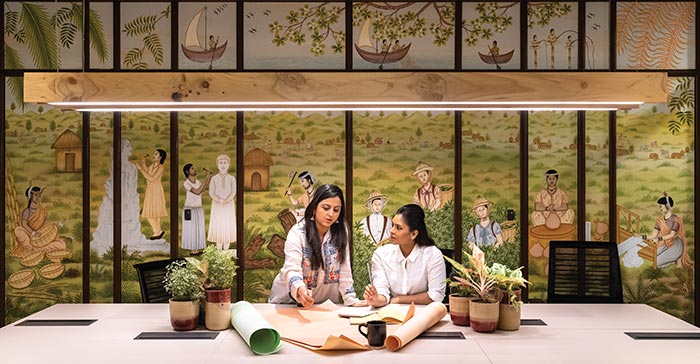
In addition to design, Chhabra also is concentrating on service and community. He says that’s the best way to affect change among Dextrus’ members, the companies that stay with them over time: “As a brand, we focus on being conscious, like attempting to go zero waste. Building our internal capabilities is not sufficient to accomplish this; we also must educate our community.” Chhabra sees this as a way for Dextrus members to come together and celebrate its benefits, noting, “Having been through the isolations of COVID, we all could do with a little more community.”
Another part of Chhabra’s philosophy of pushing the envelope is his decision to expand even amid the volatility of the pandemic: Dextrus has jumped from a 15-person staff to nearly 30 in the past year. Now an entrepreneur in a time of global uncertainty, Chhabra insists he never thought entrepreneurship was for him. Maybe having his own architecture practice one day would be one thing, but “starting Dextrus was taking things to a level I never thought I’d be capable of.” The secret to taking the leap, he says, is “being a little bit blind so you can shut out the worries that creep in. And having a support network that will push you off the cliff.”
As he looks beyond the rockiness of the pandemic, Chhabra is thinking about how he can parlay Dextrus’ expertise in designing small office spaces into larger projects and a broader impact on the real estate industry. In doing so, he embraces the classic entrepreneurial mindset: “I’m a long-term thinker,” he says. “Something tells me that I have to just keep at it, that now is a good time to expand. The recent signs might have been troubling, but I’m anticipating what’s coming, and I want us to be ready.”
— Amy Spooner

